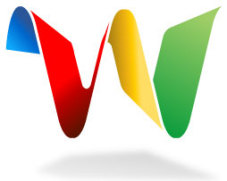 Why is Google Wave important? Well, the toys of today are the tools of tomorrow, a compelling keynote for a developer conference is cool and all, but there’s more on the upside:
Why is Google Wave important? Well, the toys of today are the tools of tomorrow, a compelling keynote for a developer conference is cool and all, but there’s more on the upside:
- Google Wave is poised to reshape (rewires I say) the nature of communication (yes, more face-to-face real-timelineness communication), improving the web experience. We probably need to experience and use it a while to understand its potentials completely …
– A wave is equal parts conversation and document. People can communicate and work together with richly formatted text, photos, videos, maps, and more.
– A wave is shared. Any participant can reply anywhere in the message, edit the content and add participants at any point in the process. Then playback lets anyone rewind the wave to see who said what and when.
– A wave is live. With live transmission as you type, participants on a wave can have faster conversations, see edits and interact with extensions in real-time.
And as we’re moving onto more real-timeness and collaboration already (think Friendfeed lifestreams, real social bookmarking and annotation, social news and more), this is much more than another Google service:
- Yes, it’s a promising product, framework and protocol.
- Yes, it’s got an API which is devised to allow “developers to embed waves in other web services and to build extensions that work inside waves”. With HMTL 5 and a supportive browser we get an app that is part wiki, part chat, part forum, part collaborative office and document (nah, content) sharing tool and part email. We get multi-user real time editing – be it in uploaded photos, videos or other stuff (alas, you can’t edit the photo or the video but you can collaboratively tag the uploaded files). It’s possible to play-back the history of the document to see how it evolved (think wiki page history on a ton of steroids).
- Yes, the platform will be open-sourced, it will be able to run on any server, so it won’t belong to Google. It’s a standard thing so whoever is hosting waves can build no walled garden (you listen Facebook, do you?) but must ensure interoperability (yes, like with plain old mail). One step closer to living in the cloud of distributed apps and data. And it’s playing along the lines of integration and adaptivity … so I can’t wait to put this on my own servers
At last, one more thing, something that explains why Google is such a remarkable company – it’s the story behind Wave. Starting from the question “Could a single communications model span all or most of the systems in use on the web today, in one smooth continuum? How simple could we make it?” they have achieved a lot. And Google’s introductory blog post has the innovation story, ie. why it must have been Google to say yes to this idea and on the early days of Wave (more on Google innovation culture, ie. a company whose unique culture shows through in small ways):
When Lars Rasmussen first floated the idea, Google co-founder Sergey Brin wasn’t impressed. “He came to me and he said ‘This may sound kinda crazy, but we’re going to reinvent communication and we just need a bunch of engineers to go of to Australia for a while and we’ll get back to you after a couple of years,'” Brin remembers. “It was not a very compelling proposal.”
More wave information at the usual places, like Techcrunch, Tim O’Reilly (Open Source, Open Protocol, and Federated Wave Clouds), Forrester, Mashable
And yes, you can sign up for Google Wave updates
The engineer in me is screaming all you stated in your post, but the buts may give an answer why it was Google to come up with this kind of product (? … service? … idea?).
Google seems to make that much revenue from advertising that the seem to have no problem in staffing a multi-year project without having an idea how to earn money from it (direct or indirect).
I highly doubt that replacing eMail will succeed. Just trying to imagine some or our Lotus product managers looking for any reasoning to invest in Wave-enabling our products.
More of my thought on LAYER8 @ ibm.com
Danke für Eure Beiträge zu Wave!
Wir beginnen gerade das erste “German Wave Camp 2009” anzuschieben:
http://WaveCamp.org
WaveCamp.org dient als Netzwerk zur Vorbereitung und Planung des ersten German Wave Camp 2009 in Berlin sowie dem monatlichen WaveWednesday in Berlin.
Diese (Un-) Konferenzen sollen dazu beitragen die gesellschaftliche Innovation rund um das Google Wave Federation Protocol in Deutschland zu fördern und die an diesem Ziel Interessierten miteinander zu verbinden.
Das Netzwerk ist offen für alle, die gerne mitmachen möchten! In den Foren können auch kreative Gedanken ausgetauscht werden rund um den Einsatz von Wave in Bildung, Unternehmen, Organisationen usw.
Falls euch Wave noch mehr interessiert und ihr Lust an weiterem Austausch habt, schaut einfach vorbei. Wir würden uns freuen euch auch dabei zu haben! 🙂
Liebe Grüße
Ingmar
[…] The Wave takes collaboration to a whole new level,” says Maish R Nichani. while Markus Frogpond writes, “Google Wave is poised to reshape (rewires I say) the nature of communication (yes, more […]
[…] the sequel, wasting time waiting for my Wave invite, watching short and longish videos (that one, again for crying out […]